Yves GARY Hits: 4626
Category: 1920 : CHALLENGE N°13
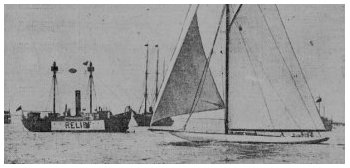 AMERICA'S CUP STAYS HERE
AMERICA'S CUP STAYS HERE WEDNESDAY, JULY 28, 1920 - When Resolute and Shamrock IV started making ready in Sandy Hook Bay for the fifth and ...
WEDNESDAY, JULY 28, 1920 - When Resolute and Shamrock IV started making ready in Sandy Hook Bay for the fifth and ...
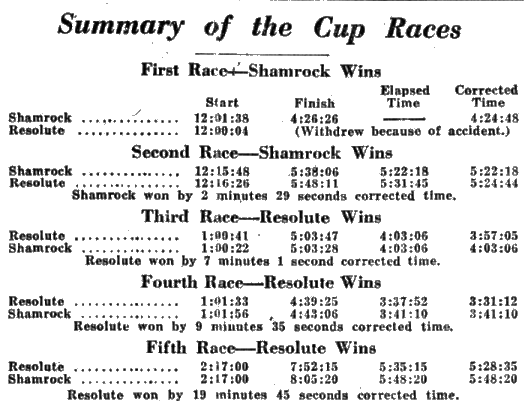
... deciding America's Cup race it looked as though another day of breathless doldrums was setting in. It was the third attempt to sail the concluding contest, and the prospects early in the day were anything but encouraging.
There was a fair sailing breeze blowing out of the northwest, but there was nothing about it that indicated stability. The more or less reliable long-shore folk at the Hook said that it was a fake wind that would suspend operations an hour before noon and leave the Atlantic flat and smooth. It was.
When the ships bell above the bridge of the destroyer Semmes tolled six bells the wind gave one fluttering sigh and took itself off to wherever deceased winds go. After that an atmospheric flatness set in that made Monday's calm seem like a roystering sou'wester. It was so still that the buzzing of Jersey mosquitoes could be heard as they zoomed over the Highlands.
The James Dougherty took the defender in tow, while the Governor Smith, which looks as though its keel might have been laid in Oliver Street, tossed a line to the green tea clipper. Both boats had mainsails and club topsails up and carried their head-sails in stops.
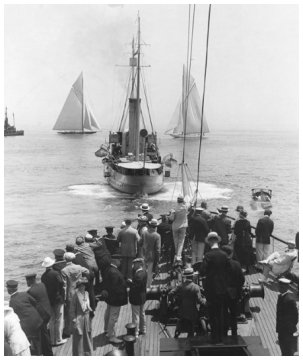 Some Misleading Zephyrs
Some Misleading ZephyrsWhen the towboats cast their charges to the mercies of tho steaming sea there wasn't a zephyr strong enough to stir the silken "tell-tails" at their mastheads. A misleading breath came down out of the northwest about 11:30 to raise false hopes in the breasts of the indefatigable yachting fans who had come out for their regular Tuesday sunburn. This wavering flicker aroused sufficient enthusiasm on both racers to cause head-sails to be broken out, and the two boats started footing about sleepily. The feathery breeze soon died out, and at 11:45 the committee boat Baryton hoisted the familiar postponement signal.
The sun was as strong a3 the wind was weak, and while the yachts remained frozen on the shimmering surface of the sea tho spectators sweltered and thought of the cold bottles that used to relieve such situations in wetter days.
Howard Borden, in a seaplane, relieved the monotony somewhat by alighting near Sir Thomas Lipton's steam yacht Victoria and inviting some of the baronet's guests to go skying with him.
As the becalmed minutes drifted into hours it seemed certain that the decisive combat was to be put over another day, but at 1:30 o'clock distant dabs of wind could be seen rippling the surface far down to the southwest. There was then a hope that the wind would come up with the tide, which had started to rise shortly after noon.
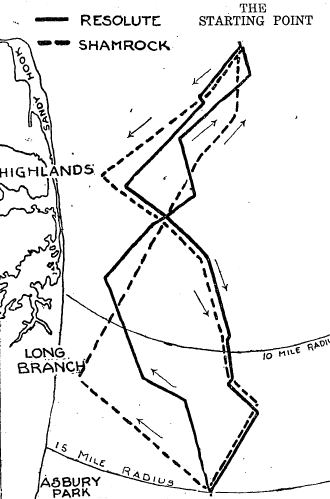 Postponement Discussed
Postponement DiscussedThere was a consultation between the race committee and the skippers of the opposing yachts as to the advisability of calling the contest off, but it was decided to wait a few minutes more. These minutes brought the wind and at 1:50 the committee boat signaled that the course would be a 15-mile windward thrash to a mark anchored off Ocean Grove and a leeward run of the same distance to the finish line at Ambrose Light vessel.
When the preparatory signal was raised the breeze had improved, although it was decidedly fitful and streaky. There was enough of it, however, to permit the most brilliant sort of jockeying before the start.
In this preliminary maneuvering, which was sharp and snappy, Captain Burton, on the challenger, took the honors and the advantage by a wide margin. It was the first time that the judgment and skill of the Englishman had outclassed that of his New England opponent. It was a brilliant getaway that must have thrilled those on the Victoria as they watched the green sloop go over in the windward berth and forty seconds ahead of the defender.
 The warning signal was flashed at 2:10 while both yachts were "cruising considerably to the eastward of the committee boat, which was on the leeward end of the line. They came down slowly and both were directly on the line and headed for the lightship on the weather end a few seconds before the starting flag was broken out.
The warning signal was flashed at 2:10 while both yachts were "cruising considerably to the eastward of the committee boat, which was on the leeward end of the line. They came down slowly and both were directly on the line and headed for the lightship on the weather end a few seconds before the starting flag was broken out.
The signal came too late for Burton to cross without first coming about astern of the lightship, but he made this jibe in snappy fashion and got back in time to get away with Resolute pinned in his lee. Due to the extra, jibes necessary astern of the lightship both yachts went over the line after tho two-minute time allowance for starting had elapsed.
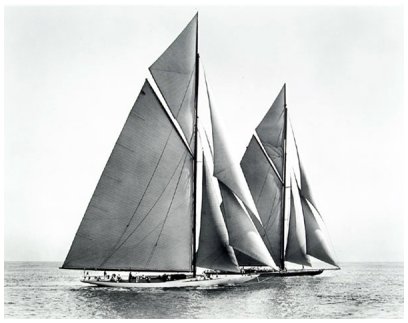 Both Boats Penalized
Both Boats PenalizedShamrock crossed at 2:17:05 and Resolute at 2:17:45. Under the rules both were penalized the extra seconds, which made the official getaway time for each exactly 2:17. The yachts went over on the starboard tack, but held it for only sixty-five seconds, when they shifted to a port tack and headed in for the Jersey shore. At this time both were carrying mainsails, club topsails, stay-sails, jibs and number two jib topsails.
For the first time since the America's Cup series began Captain Adams appeared chagrined at the position in which he found himself immediately after the start. His boat had hardly slipped over the line before the Marble-head "sandbagger" began a desperate battle to get out from under Shamrock's lee.
The long port tack took the yachts in toward Seabright, and on this hitch something happened that proved a heavy handicap to the defender and might have been the means of putting her out of the running altogether. On this tack Adams succeeded in running through Burton's lee, but while he was footing faster he was not pointing so high as the Englishman. The challenger never seemed to cat into the wind so well as she did in the early part of yesterday's beat.
At this stage of the proceedings Adams began a maneuver that, although it failed twice, ultimately enabled him to cross Shamrock's how and regain the weather berth. It might have been successful on the first attempt if two long tows had not steamed directly across the course of both racers.
 A tug with three barges strung out a mile behind her got in the way of the defender and forced her to take an extra tack to starboard in order to avoid a clash. Shamrock was at this time more than 150 yards to windward of Resolute and it was this position that permitted her to make around the end of the tow. The American boat's enforced tack gave Captain Burton a long lead that he would not have had otherwise.
A tug with three barges strung out a mile behind her got in the way of the defender and forced her to take an extra tack to starboard in order to avoid a clash. Shamrock was at this time more than 150 yards to windward of Resolute and it was this position that permitted her to make around the end of the tow. The American boat's enforced tack gave Captain Burton a long lead that he would not have had otherwise.
The first tow was shooed off the course by a submarine chaser, and the second one was headed off in time to prevent her from interfering with Resolute on the next tack. When the defender had room to clear the tow she returned to the port tack and a few minutes later the same submarine chaser, which appeared to be the only boat in sight that was policing the course, succeeded in turning back a New York and Porto Rico liner that was bearing down on the tiny racing shell.
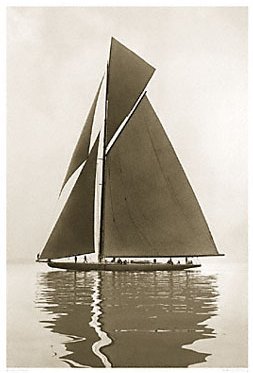 Shamrock jibed at 3:03, but Resolute held the port tack until 3:08, when she came about squarely under tho challenger's lee. Both yachts were well in toward the Jersey shore by this time and the southwest wind had strengthened and grown more steady, although its velocity was not more than eight or nine knots, which was considered ideal for Resolute. On the starboard tack the yachts were so close aboard that a sixteen-pound shot could have been tossed from one to the other.
Shamrock jibed at 3:03, but Resolute held the port tack until 3:08, when she came about squarely under tho challenger's lee. Both yachts were well in toward the Jersey shore by this time and the southwest wind had strengthened and grown more steady, although its velocity was not more than eight or nine knots, which was considered ideal for Resolute. On the starboard tack the yachts were so close aboard that a sixteen-pound shot could have been tossed from one to the other.
Adams made game and repeated efforts on this hitch to work out of Burton's lee and work across the latter's bow, but he could not get sufficient headway on his boat to accomplish this, although at one time he managed to nose out in front for a considerable distance.
For an hour the sloops continued this duel for the windward berth, first one and then the other taking a slight lead. At 3:35 Shamrock appeared to get the better of the breeze, and it became apparent to Adams that if he as going to get out of the Britisher's lee he would have to pursue some other methods. The challenger began to foot faster than the American boat and at 3:40 had her completely blanketed. Five minutes later she was out in the lead and open water appeared between the yachts.
Adams then began letting the defender run off to leeward, and she immediately gathered speed and opened up what looked like a lead, although she was still considerably to leeward.
 Resolute's skipper apparently believed that this maneuver would permit him to cross Shamrock's bow, and with this end in view he shifted to the port tack at 4:08 and the two sloops began to converge as the challenger remained on the starboard hitch. This was one of the most interesting moments of the entire contest and it looked for a time as though the American skipper was to be successful.
Resolute's skipper apparently believed that this maneuver would permit him to cross Shamrock's bow, and with this end in view he shifted to the port tack at 4:08 and the two sloops began to converge as the challenger remained on the starboard hitch. This was one of the most interesting moments of the entire contest and it looked for a time as though the American skipper was to be successful.
As the two boats came together, however, it became apparent that the maneuver was to be a failure. Resolute missed her chance to cross Shamrock's bow by a matter of inches, and when she returned to the starboard tack again she was once more squarely in the Englishman's lee and as bad off as ever.
Adams knew his boat, however, and showed his confidence in her ability to out foot the Lipton boat by repeating the same maneuver fifteen minutes later. This time the defender caught a fine breeze as she eased off to leeward and soon opened up a long lead on Shamrock, which continued to point high, but move slowly.
When the American boat came about on the port tack she was well ahead, and when she returned to the starboard hitch once more she had not only won the windward position, but had a comfortable lead besides.
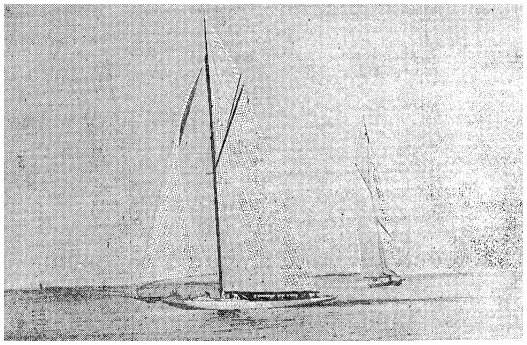 The wind was dropping again by this time and came in puffs that seemed to favor Resolute. At 4:48 both yachts went over to the port tack and held to the outer mark, which Resolute turned in brisk ashiofn. Just before going about the defender dropped her jib topsail, and as she straightened out for the run home she broke out a ballooner.
The wind was dropping again by this time and came in puffs that seemed to favor Resolute. At 4:48 both yachts went over to the port tack and held to the outer mark, which Resolute turned in brisk ashiofn. Just before going about the defender dropped her jib topsail, and as she straightened out for the run home she broke out a ballooner.
It was on the long tack leading up to the first mark that the Herreshoff sloop opened up the lead that assured her of victory and killed the fourth Shamrock's last chance of capturing the America's Cup.
Resolute had a lead of four minutes and seventeen seconds on the challenger at the outer mark, but ever then there seemed a chance that the latter might possibly give a wonderful performance on the run down the wind and make up both her lost ground and the defender's time allowance.
The shifting of the wind made the last leg a broad reach for Resolute, and although the wind was faint and puffy her sails filled well and she maintained her headway.
As usual, the challenger made a botch of the turn and by bungling work with her canvas lost much valuable time and probably the last chance she had of winning a boat for boat victory over Resolute. Burton apparently thought at first that he could make the last leg a run and with this in view prepared to set a spinnaker after he had made a rather clumsy job of getting out his balloon jib. He changed his mind, however, and after much delay in which the challenger lost all her headway, he resorted to his freak fiddler's jib, which had proved so valuable in Shamrock's only real victory of the series.
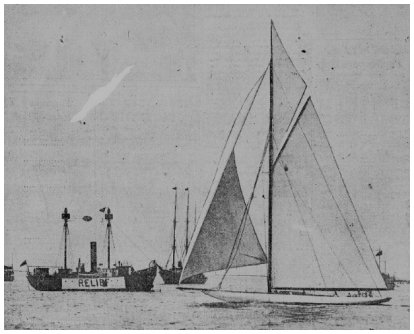 The setting of this remarkable wing seemed to take the wind out of the ballooner and it was doused two minutes after it was set. At this time there appeared to be a great deal of confusion aboard tho green boat and her men seemed to be falling over each other in their efforts to carry out orders.
The setting of this remarkable wing seemed to take the wind out of the ballooner and it was doused two minutes after it was set. At this time there appeared to be a great deal of confusion aboard tho green boat and her men seemed to be falling over each other in their efforts to carry out orders.
When Burton finally got his saddle filled once more and had started Shamrock on her way to the finish, the defender was a mile in the lead and doing a lot with a trifling breeze. When seven and a half milts from the finish the challenger set her spinnaker to starboard, but the big sail seemed to render her but little assistance.
At this stage of the race it was apparent that Shamrock was out of the running and it was to be merely a question of whether Resolute could cross the line within the time limit of six hours, in order to have tho contest regarded as an actual race. The race between Shamrock and the time limit was far more exciting than the one between defender and challenger. The time limit expired at 8:15.
When Resolute was off the Shrewsbury Buoys she had seven miles to cover in one hour and twenty minutes and very little breeze, to do it on. Adams seemed to have the time and distance well calculated, for he took Resolute on a breeze hunting expedition inshore and probably profited by it. Then a long tack to seaward put him in position to cross the line and he went over amid a roar of salutes. He was more than a mile ahead of Shamrock.
